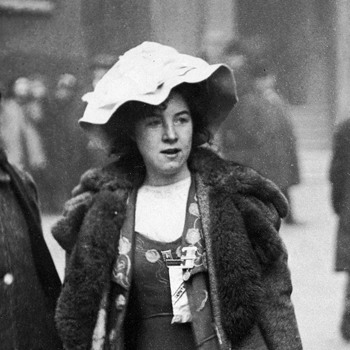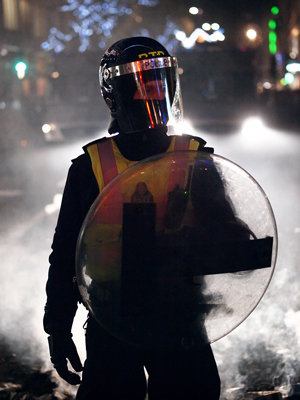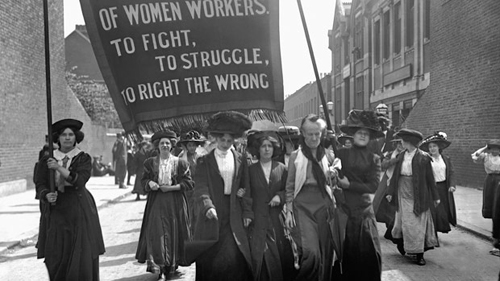
Your complimentary articles
You’ve read one of your four complimentary articles for this month.
You can read four articles free per month. To have complete access to the thousands of philosophy articles on this site, please
Short Story
An Unwanted Visitation
Craig Potter on a conversation out of time.
From the darkness of the hallway, she pushed through into the dimness of her small flat, guided by the small window of light up ahead. It was a miserable place to waste away a summer’s afternoon, but they had been routed and had to take flight once again. She bundled her way into the tight entry with her unwieldy placard, reaching out to hang her hat on the wobbly stand beside her, and made towards the brighter inner sanctum of the sitting room.
There came the sound of a long human breath, heavy with exasperation.
She paused, all her muscles taught, as her mind tried to search around the door frame and into the living quarters. The police? A vengeful man? An outraged wife?
She had many enemies. Yet, confident and proud as she was, she wasn’t perhaps as afraid as the situation warranted, and quickly summoned her will to confront the danger. Tentatively retracing her steps, she drew a pointed metal umbrella from beneath her hat-stand, and, holding it out like a lance, rushed into the light.
A man stood before her in the centre of the room. She stopped. Her heart fluttered in fear and panic as she held the umbrella two-handed like a mace against her shoulder, expecting to be attacked. Yet he just stood there… and how pathetic he looked, actually.
Confidence resumed: she could take him. But who was he? Did she recognise him from somewhere? What was he doing here? His face was youthful, but twisted with anxiety, and marked with the suggestion of a deep inner weariness. His hair was all askew. His skin was pale and his face haphazardly shaven, with what unfortunately seemed to have been deliberation. His dress was shabby, simple, but not in the manner of the poor, not like anything she had seen; it looked excessively casual and ill-fitting. It bore little sign of definite status or class, as though more of an artisan or religious costume. Burglar, undercover inspector, priest, or escaped madman; there was simply no way to tell.
“I tried to make some tea, but I couldn’t work out the stove; there’s no starter for it,” he apologised, turning his back to her and then dropping into an armchair, as though she had caught him midway through an anxious sequence of pacing and sitting. “I’ve no idea how I got here either,” he added, somewhat anticipating her next question. He spoke without warmth but rather a miserable resignation, like someone well-adjusted to constant uncertainty. “It’s probably a dream, but okay, whatever,” he murmured to himself with bad mannered flippancy.
“Who are you?” she asked bluntly in her most commanding tone.
“A student,” he said, almost to himself again: “Politics and Global Citizenship.”
“A student… of politics?” she asked, bemused. “As in the phrase, ‘a student of the game’?”
“No. I’m an actual student. You know, enrolled at university.”
This man was making no sense at all; one went up to read law, medicine, classics or the like; politics was something one did, not studied.
“Anyway, who are you then?” he asked, settling back in his chair expectantly, immediately dismissing her intention of extricating him from her home.

The real life Mabel Capper (1888-1966)
Well, he did not seem dangerous at least, she thought tentatively, permitting herself to alight on a pouf opposite him, arranging her skirts matter of factly. “Mabel Henrietta Capper,” she announced with perfected politeness, once comfortable in her position.
“Ah, the liberal feminist!” he said, suddenly beaming with enthusiasm, as though already well acquainted.
“Liberal?” she replied, wondering whether or not to be insulted.
“One of the suffragettes. You campaigned to get votes for women passed in 1918, if I remember correctly. The right was expanded to all those over the age of twenty-one ten years later.”
‘Wonderful, he thinks he’s from a future of his own making,’ she deduced with the wryness for which she was admired, but she remained silent. Now, how to get rid of him? Perhaps tip him from his chair; maybe lure him with a sugar cube? That might work.
“…had limited other influence, aside from publishing a play or two. Your ideas were generally timely, if conservative by modern standards and denounced by the second wave feminists of the 1970s as right wing: supportive of the family, the woman’s reproductive role, and male hegemony over the workplace and society. Third wave feminism admired the solidarity, but psychoanalytically determined that you were overly concerned with imitating male role models rather than fully committing to separatism. Later, after the collapse of ideology and the rise of neo-liberalism, you were re-admired as a strong female role model and considered a big influence by the former Prime Minister,” he continued unasked.
Lucid madness that it was, she was enraptured by the biographical concoction, and found herself desiring intently to know what he was talking about, if for no other reason than educated curiosity at the workings of the mind of the deranged. “I don’t know what you mean,” she politely inserted, with a slightly patronising note.
“No, I don’t suppose you would; locked into your own social structures, discourse, and zeitgeist. There’s not a whole lot of point explaining it, it won’t make a difference.”
Ignorance had always appalled her. The possibility that devices were at work holding her back, limiting her liberty, flared up her rebellious spirit immediately.
“The question we have to ask is whether greater enfranchisement actually benefits the cause of a social democratic agenda?” he said to the air in imitation of some higher authority.
“Look man, make sense! I have no idea who you are. You’ve made yourself at home. If you wish to engage in rational dialogue, you will find me as perspicacious as any man,” she said with irritation, trying to bring his attention back to the present situation.
“Okay then,” he said in that annoying way of his. “The question is: if we look back a hundred years from now, are you justified in your campaign to widen the vote?”
“Yes, vehemently yes! Were this a matter of the male right to vote, would you ask such a question?
“Good point – though unfortunately most of us have forgotten about all that. It’s only really you suffragettes who are remembered. Chartists are just not as memorable as, say, Emily Davison getting hit by that horse. It’s done better at capturing the public imagination. I think all feminists are indebted to that. Bra burning, slut marches… it all starts with you guys.”
“What? What are you talking about?”
“Never mind. It wouldn’t help your present cause. Anyway, you’re right. Votes for women is not the specific issue here. What I mean is, concerning both your campaigns, which greatly expanded the electorate in Britain, for men as well as women – has democracy benefitted from or suffered from the participation of the masses?”
“You sound like a trade unionist. Is that it? Have the Fabians sent you here? Because I’ve already said that we’re not –”
“No, no, don’t worry about it. Everyone talks like that these days… I mean, where I’m from. It’s because we don’t revolt about anything that we’re so good at sounding like radicals.”
“I follow,” she said, a strident pride returning. She was a woman who got things done. It explained his timidity, this student, if all he did was think about things. “So from what you are saying, in your land – sorry, ‘the future’ – I take it that people are unhappy with the state, even though they have full enfranchisement?” she said, pleased to have gathered her acumen to engage on his terms. After all, being talked down to by men was no novelty.
“Exactly. With the influence of the media, power has become a popularity contest, and the intelligence of the electorate is still a world behind the responsibility granted them. Again and again they are manipulated, their pettiness and small-mindedness granting mandates to inveterate liars, inexperienced or irresponsible demagogues…” He struck a chord here. She had at times been overwhelmed by the acrimony of those she was trying to help. Women themselves were often among the worst hecklers, and the newspapers seemed entrenched against their cause. That nothing would change in a hundred years, even with the right to vote, was a terrifying possibility.
He continued, “The lack of understanding has widened the gap between rich and poor, creating more and more inequalities and divisions, extending across geography and generations. The sense of being outnumbered and unrepresented creates a growing sense of apathy on both sides of the political spectrum, so election turn-outs decline, only furthering the interests and ideologies of a narrow and privileged elite… The problem is obvious: democracy itself is a failed project. Say that, however, and we have been conditioned to automatically think of you as a fascist – sorry that’s not been invented in Italy just yet – as an enemy of freedom.”
“Yet without democracy you enable tyranny – the rule of the few who cannot be held accountable for the lives of the many,” she countered, taking his ideas seriously, if not agreeing to share his reality.

A modern-day guardian of law and order
Police in riot gear © Hozinja 2010
“Oh yes, I agree, nobody has yet succeeded at a better practical alternative. And yet, typically speaking, the opinion of the very worst voter – bigoted, stuck in their ways, making no effort to read policies – has equal standing with that of the most experienced and kind-hearted egalitarian. Ironically, people drag names such as your own into the ring to justify what has become an inalienable right to give voice to an unmitigated, unchallengeable opinion on everything, however great the ignorance and the misinformation which formed it!” Looking around the drab little flat, he said inwardly, ‘I guess it’s despair that brought me here,’ and paused for a moment. Mabel herself had now discarded her umbrella and was settled into the pouf, leaning forward eagerly, better to engage in the debate. He resumed with aplomb, “So what I would like to know is, do we citizens of the future world have the right to challenge the legitimacy of your ideal of universal suffrage, knowing as we now do that it contains the possibility to fail?”
They both remained mute for a time, saddened by the accusation, as though feeling themselves connected across the ages at the very moment of their fall-out. For her it was the potential folly of her unquestionable purpose. For him, it was wielding the weight of a century’s events in order to extinguish well-meant dreams with their own hard consequences.
Possessing the greater alacrity, it was she who finally broke the silence: “I don’t think we were meant to meet,” she said. “This is not how time works. It doesn’t catch up to itself again. It keeps moving, and we are both as much a part of this process. Do you not go out and protest? Go out onto the street, make your voice heard, defy the rule of the minority?”
“No, because nobody listens, until we break something, and then we’ll be arrested,” he moaned hopelessly.
“Then that much has not changed. I’m glad to hear that I am regarded well, and my legacy has survived as a ‘liberal’ –¬ at least in what I gather is your sense of the word – but in my time I consider myself a warrior, a freedom fighter. I am not afraid to make a stir. Willingly, I have sacrificed my entire reputation for it.”
“In my day you’d probably be a terrorist,” he offered glumly.
“The point is, however, with a hundred years of change to judge me on, you have accused me of being misguided. But who is to say that those hundred years have not simply carried on where I left off, like ‘waves’ – is that what you called them? The same applies to anyone who uses any campaigner as an excuse not to think for themselves. I think you are projecting your powerlessness backwards rather than onwards,” she consoled.

Suffragettes march 1911
His sad face looked down at the rug, his hands playing about as he thought, while she, his captive audience, awaited the revelation she had hoped to plant in his mind.
“You’re right. It’s not fair to blame you, But it really does seem an impossible mess to fix, at least peacefully,” he said.
She thought further for a moment, fully embroiled in this amazing cross channel of time, which she now no longer doubted was real, as stimulating as it was. Then she said, “It’s strange isn’t it, that what I love, what I am willing to die for, you disparage; and yet we do not disagree with one another on principle? We both want the best for the greatest number. To which, I propose, you have come to the wrong place for an answer, when what you need above all is not an idea but a new way. My generation has been brought up knowing our masters, fighting with all our spirit only for the marginal freedom of being able to choose their substitutes, and you…”
“Yes. I come from an era of many and much. My world is smaller, crowded, and lonely. We can expect to live longer, most of us have more than we need, the relatively few that don’t only seem to want what they do not require…”
“Then your problem is your very gluttony! You want to pick your leaders like the most delightful option on the menu. If that is so, you are right that protest will not work. In such a circumstance I can imagine people protesting about all and everything, each occupied with their own limited concerns rather than the good of all.” She thought a while before continuing, as he waited, immersed in her polemic. “Perhaps you just need to sit back and let what has broken break a bit more, rather than being yourself the hammer,” she determined.
This time he said nothing, only smiled. This was the answer he had come here for.
“Thank you,” he said finally. Satisfied, he closed his eyes as though about to fall asleep, and then simply vanished.
She stood looking at the empty chair with a small pang of loss, weighing his words, considering the longevity of her cause.
‘Our truths are our inevitability!’ she thought after a time; and turning back down the corridor, picked up the placard and marched out of the door to introduce a little more civil disobedience into the world.
© Craig Potter 2019
Craig Potter is a sociology graduate with an interest in the philosophical short story.









